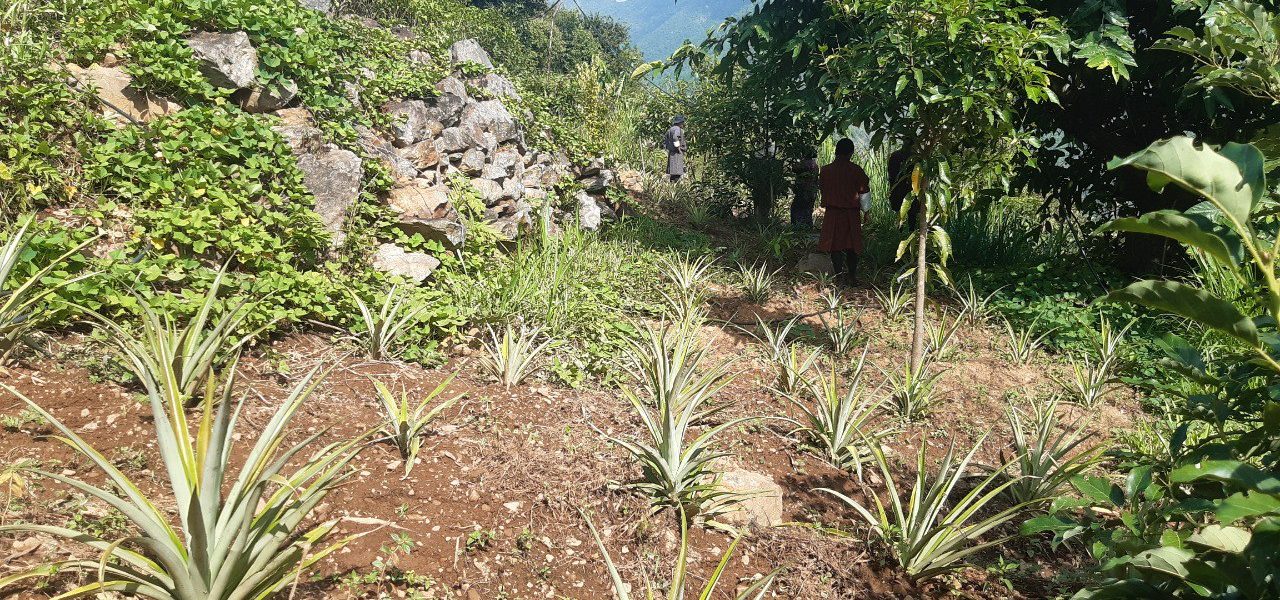Climate change is inevitable and cannot be prevented and thus addressing the impacts of climate change through mitigation measures has become important for sustainable natural resource management, livelihoods enhancement and climate resilience. The impacts of climate change in farming are unavoidable and more so small-scale farming communities are worst effected and face the impacts manifested through droughts, water scarcity, wind storms, floods, Human Wild Life Conflict, pest and disease outbreak and so on making them more vulnerable to food insufficiency and poverty.
Understanding the impacts of climate change and developing solutions to enable farmers adapt to the changing climate is better through an inclusive approach of participatory vulnerability assessments to identify the most appropriate the solutions and implementation through a communal approach. A package of climate resilient farming practices – Climate Smart Agriculture (CSA) technologies and solutions to fit within the local conditions implemented in Ngarpontang Climate Smart Village in Mongar, Bhutan over a period of some five years with support of Commercial Agriculture and Resilient Livelihoods Enhancement Program (CARLEP-IFAD /MoAF) have resulted in enhancing community resilience to climate change impacts resulting though enhanced livelihoods from increased crop yields, income and enhanced food security. More land is put under cultivation to diversify their crops. Greenhouse gas emission from farms have been channeled into proper utilization through adoption of Bio Gas technology. Water, a scare resource for the community is now sufficiently made available through construction of dryland irrigation scheme. Crops have been protected from wild animal with the establishment of a community electric fence. Community social capital has also improved bringing farmers closer to each other.
CSV Ngarpongtang intervention in which a package of CSA technologies with validations through PVS prior to interventions implemented through a holistic community approach has brought about lasting impacts contributing to enhancing community resilience to climate change impacts. The success of this can be replicated in others.
Some of the key results of CSV intervention are as follows:
Water shortage, the biggest problem in the village is now solved through the establishment of 10 Km dryland irrigation with a command area of 147 acres benefitting 50 households in the community
The availability of water has enabled crop intensification – composed of cereals, fruits and vegetables which resulted in expansion of farming by some 8 % for every household. Fruit orchard development has increased by about a langdo (0.33 acres) for every household. Crop diversity has been enhanced
Crop loss to human wild life conflict has been prevented through the establishment of 6 Km electric fence covering some 138 acres
Livestock farming has been integrated with crop cultivation. Improved pastures have been adopted. $ % of the households have started to keep improved cattle that enhanced milk production by 11 %, Poultry number per household on average increased by 54 % with a 130 % increase in egg production.
Food sufficiency has increased to 79% from 28% in the past. Green house gas emission is reduced by adopting bio gas technology. 16 households have taken up biogas which has contributed to reduction in firewood usage and increased time for off farm works by men and homestead kitchen garden by women which led to increased income from both off farm and homestead nutrition garden.
The community of Ngarpontang is now market liked with the Bhutan Agro Industries through adoption of contractual farming of pineapples. A total of 10 acres of pineapple cultivation has been initiated and more farmers are coming forward.
Climate Smart Village intervention is coordinated through the Agriculture Research and Development Centre at Wengkhar in partnership with the Dzongkhag Agriculture and Livestock Sectors, Mongar, the Regional Livestock Development Centre at Khangma, Trashigang, the Thangrong geog Administration, Office of Program Management, CARLEP – IFAD/MoAF and 47 farming household of the village of Ngarpontang. A total of Nu. 4.967 Million has been spent over a five year period ( 2017-2021) including beneficiary contributions through labour and some local materials for dryland irrigation and electric fencing.
208 total views, 1 views today



